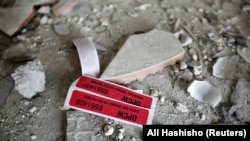The international community must continue to press Syria on its inaccurate and incomplete Chemical Weapons Convention declaration while seeking accountability for the Assad regime’s repeated chemical attacks against the Syrian people.
On January 5, at a UN Security Council briefing, Adedeji Ebo, Deputy UN High Representative for Disarmament Affairs, told the Council that the Syrians had made no progress in resolving outstanding issues related to Resolution 2118. This resolution requires Syria to declare and verifiably destroy any chemical weapons in its possession.
Additionally, he said, “Efforts by the OPCW [Organization for the Prohibition of Chemical Weapons] Technical Secretariat to organize the next round of consultations [with the Syrian regime] …continue to be unsuccessful.” Mr. Ebo informed the Council that, due to the Syrian regime’s lack of cooperation, the OPCW will send only a reduced team to Syria for limited discussions in January. He underscored the absence of accountability for the Assad regime’s use of chemical weapons “is a threat to international peace and security and a danger to us all.”
U.S. Deputy Representative to the United Nations Richard Mills said it was “tragically, sadly fitting that we start a new year in the Security Council yet again addressing how the Assad regime has repeatedly used chemical weapons and failed to comply with its obligations under the CWC [Chemical Weapons Convention] and UN Security Council Resolution 2118.”
While welcoming the news that the Declaration Assessment Team will be in Syria in January, Ambassador Mills emphasized the need for the regime to end its obstruction so the OPCW could “meaningfully resume its work
. . .because many questions regarding Syria’s declaration remain unanswered.”
Among them, he noted, is the lack of a credible explanation for the detection in 2018 of a scheduled chemical at the Scientific Studies and Research Center in Barzah; for the movement of two chlorine cylinders implicated in the chemical weapons attack on Douma, contrary to OPCW instructions; and for the regime’s failure to provide documents repeatedly requested by the OPCW Declaration Assessment Team since 2019, “which would shed light on the regime’s chemical weapons program overall.”
“The United States,” Ambassador Mills declared, “again calls on the regime to comply with its obligations and immediately cease its obstruction of the OPCW’s expert teams so that we can resolve the issue of Syria’s chemical weapons use once and for all.”






